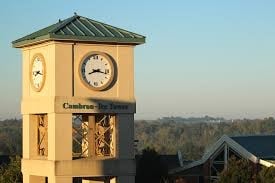You have /5 articles left.
Sign up for a free account or log in.

St. Catharine College's campus in Kentucky
St. Catharine College
St. Catharine College will shut down in July. And leaders of the small Roman Catholic college in Kentucky blame the U.S. Department of Education for its failure.
The department last year sanctioned St. Catharine over concerns about its management of federal financial aid money. The college was placed on the strictest form of a federal sanction dubbed heightened cash monitoring (HCM2), which meant college officials had to apply for the department to cover the federal loan and grant dollars the college’s students used to pay for tuition.
The feds’ withholding of aid payments damaged the college’s ability to attract students and caused an enrollment decline to a projected 475 students this fall, college officials said in a written statement. As a result, the college could not manage debt it took on, in part to build several new facilities.
Cindy Gnadinger became St. Catharine’s president 11 months ago. She said the department has moved slowly in the process, having failed to so far issue a final report of its review. The result was essentially a federal effort to shut down the college, she said, not to prod it to fix problems.
“We’ve never denied that we have room for improvement,” Gnadinger said in an interview. But the department’s “intention of strangling the college through HCM2 was very clear.”
The college sued to block the federal sanction, calling it unlawful and seeking reimbursement for aid money that had been withheld, for its legal fees and for other monetary damages. But the lawsuit has not succeeded, at least in time to prevent the college’s demise.
“Institutions that receive federal student aid funds are subject to guidelines designed to protect students and taxpayers. When a school is unable to responsibly administer those funds to meet those guidelines, it is subject to increased oversight,” Kelly Leon, a department spokeswoman, said via email. She added that when St. Catharine was under heightened oversight, the department continued to work closely with the college to “ensure federal aid dollars were disbursed in a timely fashion.” (Note: This paragraph has been changed from a previous version to include a comment from the department.)
St. Catharine’s is one of 70 colleges the department in March said were receiving the more stringent form of cash monitoring. Another 458 institutions got the lesser version, which typically includes aid payment freezes of a few days.
A majority of the colleges facing heightened cash monitoring are for-profits, often small cosmetology schools. But the most notable use of the sanction was in 2014 with Corinthian Colleges, a large and controversial for-profit chain. The federal penalty toppled Corinthian, which enrolled about 72,000 students at the time. The department also has slapped heightened cash monitoring on ITT Educational Services and Education Management Corporation, both publicly traded chains.
However, about 100 private nonprofit colleges are on the list, as are 80 public institutions, many of them community colleges. And as St. Catharine’s shows, the sanction can pose an existential threat to nonprofits, too.
St. Catharine’s had problems before the federal scrutiny of its aid payments. Enrollment began to decline from a recent peak of 667 students in 2011, according to financial documents the college disclosed to its bond holders. And the college accepted all but two of the 1,275 applications it received in 2014, when enrollment fell to 575.
The 2014 report by an independent auditor said the college lacked adequate financial management.
“The college does not have a system of internal controls that would enable management to conclude the financial statements and related disclosures are complete and presented in accordance with U.S. generally accepted accounting principles,” said the audit by Smith & Company, an accounting firm based in Kentucky, which added that “this is a repeat finding from the previous year.”
The auditors also said St. Catharine was out of compliance with several federal aid requirements. For example, they found that documentation for aid payments in some cases did not match actual amounts posted to students’ accounts.
St. Catharine’s dispute with the department began in 2011, when the college posted a default rate of more than 50 percent for its students who had received federal Perkins Loans. The rate had topped 50 percent for three consecutive years, according to federal documents, so the department required the college to liquidate its Perkins fund. It also began a compliance review, which eventually led to a site visit by a department team.
The department found a “lack of administrative capability” at the college, according to a federal filing in the lawsuit. Some concerns included evidence that the college was disbursing federal aid funds to ineligible students, the department said, and failing to return unearned aid money for students who were no longer enrolled there.
“As a result, the program reviewers became concerned that St. Catharine College was materially failing to meet its fiduciary responsibilities under” federal aid programs, the filing said.
Due to the severity of those findings, the department placed St. Catharine on the stricter form of heightened cash monitoring. But just before that action last January, the feds said, the college made an “unscheduled drawdown” of $500,000 in Pell Grant and direct loan funds. The college later told the department that it needed the money to cover payroll.
Fiery Response
Officials at St. Catharine tell a different story. And their lawyers don’t pull punches in legal filings. By their telling, the college fell victim to an unfair attack and constantly shifting federal rules.
For example, in one filing the college said the U.S. secretary of education forced a “small private college to cover the cost of his staff’s gross incompetence to the tune of a million dollars and thereby push the college to the brink of permanent failure, rob an untold number of current students and past and future potential students of their opportunity for higher education.”
The college said it took some of the department’s scrutiny very seriously. The board replaced the college’s president months after receiving the heightened cash monitoring sanction, as well as its entire senior leadership team and “90 percent of the staff in the business and financial aid offices.” It also created a new position for a director of compliance.
Yet St. Catharine also argued that the department improperly cracked down on the college for creating five new bachelor’s degree programs in recent years. The feds said the new programs were considered “substantial changes” that required the department’s permission to create, which the college did not seek.
On that charge, the college has the support of its regional accreditor, the Southern Association of Colleges and Schools Commission on Colleges. The accreditor approved the new degree programs.
“They’re still in good standing for us,” Belle Wheelan, the commission’s president, said in an interview.
A department official in February wrote to Gnadinger and said that, due to further review, the five programs were eligible for federal aid. The department released some additional funds for aid payments related to those degrees, and the official acknowledged that the “department’s approval was not required for those programs.”
Wheelan submitted an affidavit in the court case saying that during her long tenure at SACS she was not aware of any other time the department had questioned the accreditor’s approval process for new degrees. And the college said the federal scrutiny was an attempt to interfere in its relationship with the accreditor.
“I have no mechanism to argue” the federal complaints, said Gnadinger. “They place schools on sanctions and they don’t issue the reports.”
Richard Ekman is president of the Council of Independent Colleges. St. Catharine’s is one of the council’s 700 members. He criticized the department’s often “cumbersome” process around the financial monitoring of colleges, such as through its financial responsibility scores. And in the case of sanctions, he said the department’s slow responses to colleges can be a problem.
“They have not moved quickly enough,” he said, and often do not admit errors and correct them. “In some cases the department has been wrong or has been unwilling to accept information.”
St. Catharine’s pugnacious attempt to battle the department appears to be over, at least as an attempt to save the college. The lawsuit will continue, however.
The college, which was founded in 1931 and traces its origins to a much older school founded by the Dominican Sisters and located in a bootlegging still house, will shut its doors at the end of July. Its 118 faculty and staff members will lose their jobs. The college said it has reached out to other institutions to help with “teach-out plans” for students, and that it will help students try to transfer elsewhere without losing the credits they’ve earned.
Some St. Catharine students and graduates went to social media to express their shock about the college’s demise.




